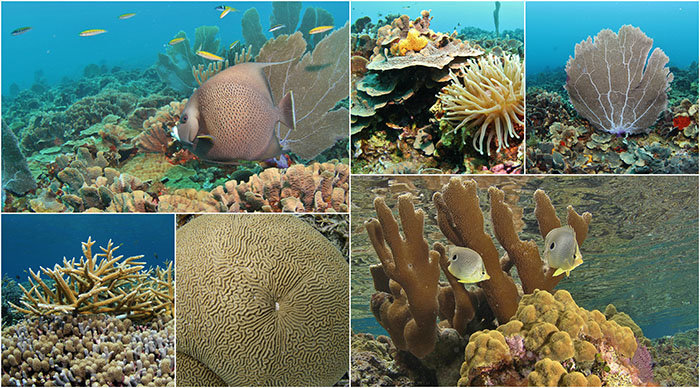By CORAL Staff | CORAL Staff
Coral reefs are one of the most diverse ecosystems on the planet and are home to 25 percent of all marine life though they occupy less than one percent of our oceans. There are sponges and corals of all shapes and sizes, hard and soft; tiny fishes like pygmy seahorses and big fishes like tiger sharks; there are anemones, nudibranchs and snails – the list goes on! Reefs are also diverse in types of habitats: fringing reefs, barrier reefs and atolls to name a few. Even a single species of coral is genetically diverse. But why does coral reef diversity matter in an era of global climate change?
We all know the facts: corals face an uncertain future due to local threats, such as pollution and overfishing, and global threats, such as climate change and ocean acidification. But without the reef-building corals, like staghorn or elkhorn, there is no reef and no habitat for the myriad forms of life that call reefs home. If we are to have reefs in the future, these reef-builders will need to adapt. Fortunately, scientific research shows us that corals can adapt to changing climates. At the Coral Reef Alliance, we are developing a blueprint based on cutting-edge science that promotes coral adaptation within diverse, connected and large networks of healthy reefs called Adaptive Reefscapes.
Our Adaptive Reefscape strategy draws ideas from evolutionary biology, economics and ecology. Evolutionary biology tells us that adaptation is more successful when there is a lot of diversity, like the diversity found within the many types of reefs, habitats, species and genes on coral reefs. In this case, more diversity means more evolutionary options for the future. Similarly, financial investors know that diversifying their portfolio can hedge bets against an uncertain future. In a diverse investment portfolio, some stocks behave independently from one another making the whole portfolio more stable. Researchers have discovered that diversity also affects ecological systems, which are less prone to boom and bust cycles when they are diverse. By combing these ideas in an Adaptive Reefscape that safeguards a diversity of habitats, species and genes, corals will be better able to adapt to global environmental changes and survive for centuries to come.
We are first applying our Adaptive Reefscape strategy to the Mesoamerican Reef, which spans the Caribbean coasts of Mexico, Belize, Guatemala and Honduras. In this region alone, there are over 60 species of coral. Two sites in this region are showing promising signs of adaptation. Corals in Tela Bay on the mainland of Honduras are thriving in murky waters. Off the coast of nearby Roatán, there are unusually lush stands of staghorn coral, which has declined almost everywhere else in the Caribbean. When corals surprise us by doing particularly well in unexpected places, it suggests that they may have already adapted to some of the threats that are facing coral reefs. Adaptive Reefscapes are designed to protect a diversity of reefs and corals so that special corals—like those in Tela and Roatán—can be the source of baby corals that will thrive in the future.
To learn more about Adaptive Reefscapes, visit coral.org/adapt or sign up for our newsletter.
By James Lloyd | Communications Manager
By CORAL Staff | CORAL Staff
Project reports on GlobalGiving are posted directly to globalgiving.org by Project Leaders as they are completed, generally every 3-4 months. To protect the integrity of these documents, GlobalGiving does not alter them; therefore you may find some language or formatting issues.
If you donate to this project or have donated to this project, you can receive an email when this project posts a report. You can also subscribe for reports without donating.
Support this important cause by creating a personalized fundraising page.
Start a Fundraiser